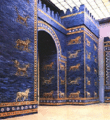Counsels of Wisdom is a piece of Babylonian wisdom literature written in Akkadian containing moral exhortations. It is composed primarily of two-line units, without sections. A translation of extant portions of the text was published in Lambert 1996. Existing manuscripts are fragmentary, but the original was estimated to be about 160 lines.
Date of authorship
Scholars disagree on the date of the work. Gemser and Frans de Liagre Böhl placed it in the First Dynasty, but Lambert believes it should be dated to the Kassite period. The work is attested primarily by a stone tablet written in Late Babylonian script.
Comparison with other wisdom literature
The text is addressed to "my son", which may be a physical son, a student, a successor, or a trope of the genre, as it is in later wisdom literature. Scholars have observed several pieces of ancient wisdom literature to be similar, including the Instructions of Shuruppak, Counsels of a Pessimist, and the Hymn to Šamaš (See Shamash). Together these works were an ancient genre. Similarities have been noticed with the Book of Proverbs, but no literary dependence has been found. The Counsels of Wisdom is believed to have been somewhat popular in its time, since fragments of this passage are quoted in other extant works. The work may have influenced the Wisdom of Ahiqar.
Kindness to Evildoers
Biblical scholar John Nolland sees a passage in the Counsels of Wisdom as a possible precursor to Jesus' command to "love your enemies": "Do not return evil to the man who disputes with you; requite with kindness your evil-doer... smile on your adversary."
See also
Notes
- Kitchen 1977, p. 114.
- ^ Lambert 1996, p. 96.
- Kitchen 1977, p. 88.
- Kitchen 1977, p. 86.
- Böhl, Frans Marius Theodor de Liagre (1942). "De zonnegod als de beschermer der nooddruftigen" [The sun god as the protector of the poor]. Jaarbericht Ex Oriente Lux (in Dutch). 8. Leiden: Vooraziatisch-Egyptisch Gezelschap: 665–680, at p. 670. ISSN 0075-2118. OCLC 643516029.
- ^ Lambert 1996, p. 97.
- Whybray 2009, p. 51.
- Greenstein 2022, p. 307.
- Nolland 2005, p. 265.
References
- Greenstein, Edward L. (2022). "Wisdom in Mesopotamia in relation to von Rad's Wisdom in Israel". In Sandoval, Timothy J.; Schipper, Bernd U. (eds.). Gerhard von Rad and the Study of Wisdom Literature. Ancient Israel and its literature. Atlanta: SBL Press. pp. 287–320. ISBN 978-1-62837-450-6.
- Barré, Michael L. (1981). ""Fear of God" and the World View of Wisdom". Biblical Theology Bulletin. 11 (2). SAGE Publications: 41–43. doi:10.1177/014610798101100203. S2CID 170183050.
- Kitchen, Kenneth A. (1977). "Proverbs and wisdom books of the ancient Near East: the factual history of a literary form" (PDF). Tyndale Bulletin. 28: 69–114. doi:10.53751/001c.30617. Archived from the original (PDF) on 18 May 2012. Retrieved 16 April 2017.
- Lambert, Wilfred G. (1996) . Babylonian Wisdom Literature. Eisenbrauns. pp. 96–107. ISBN 978-0-931464-94-2.
- Nolland, John (2005). The Gospel of Matthew: A commentary on the Greek text. The New International Greek Testament Commentary. Grand Rapids, Michigan: William B. Eerdmans Publishing Company. ISBN 978-0-8028-2389-2.
- Whybray, R.N. (2009). Wisdom in Proverbs: The Concept of Wisdom in Proverbs 1-9. Studies in Biblical Theology, First Series. Wipf & Stock Publishers. ISBN 978-1-60899-019-1.
Further reading
- Begg, Christopher T.; Duggan, Michael W.; Hieke, Thomas (2022). "The Ancient Near East: Texts, Traditions, etc". Old Testament Abstracts. 45 (2): 346–382. doi:10.1353/ota.2022.0054. ISSN 2639-2003.
- Clifford, R.J. (2011). The wisdom literature. Interpreting Biblical Texts. Abingdon Press. p. 11. ISBN 978-1-4267-5001-4.
- Cohen, Yoram (2013). Wisdom from the late Bronze Age. Writings from the ancient world. SBL Press. ISBN 978-1-58983-754-6.
- Denning-Bolle, Sara J. (1987). "Wisdom and Dialogue in the Ancient Near East". Numen. 34 (2): 214–234. doi:10.1163/156852787X00038. ISSN 0029-5973. JSTOR 3270085.
- Lenzi, Alan (2018). "'Counsels of Wisdom' as 'white-collar' wisdom in first millennium ancient Mesopotamia". In Oshima, Takayoshi M. (ed.). Teaching morality in antiquity: Wisdom texts, oral traditions, and images. Orientalische Religionen in der Antike. Vol. 29. Tübingen: Mohr Siebeck. pp. 60–69. doi:10.1628/978-3-16-156481-9. ISBN 978-3-16-156480-2. ISSN 1869-0513 – via Academia.edu.
- Lenzi, Alan (2021). "Counsels of Wisdom: An ancient Babylonian instruction for scribal students". Religion Compass. 15 (3). doi:10.1111/rec3.12390. ISSN 1749-8171.
- Greenfield, Jonas C. (2001). "The Wisdom of Aḥiqar". In Paul, Shalom M.; Stone, Michael E.; Pinnick, Avital (eds.). 'Al Kanfei Yonah. Collected Studies of Jonas C. Greenfield on Semitic Philology. Vol. 1. Leiden: Brill. pp. 334–343. doi:10.1163/9789004532014_038. ISBN 978-90-04-53201-4.
- Perdue, L.G. (2008). The sword and the stylus: An introduction to wisdom in the age of empires. Eerdmans Publishing Company. p. 7. ISBN 978-0-8028-6245-7.
- Martins, Ivo Ricardo dos Santos (2017). Liminality and the social functions of Akkadian Wisdom Literature (ca. 1200–458 BCE) (M.A. thesis). Leiden University – via Academia.edu.
- Martins, Ivo Ricardo dos Santos (13 August 2024). "Reframing wisdom through liminality in Akkadian literature". In De Martin, Sara; Furlan, Anna Lucia (eds.). Wisdom Discourse in the Ancient World. London: Routledge. p. 21-27. doi:10.4324/9781003485094-2. ISBN 978-1-03-277858-7.
External links
- II.3 Counsels of Wisdom Critical edition and translation of the text (electronic Babylonian Library).
- Counsels of Wisdom (SAT translation).
| Ancient Mesopotamia | ||||||
|---|---|---|---|---|---|---|
| Geography |
|  | ||||
| (Pre)history |
| |||||
| Languages | ||||||
| Culture/society |
| |||||
| Archaeology | ||||||
| Religion | ||||||
| Academia | ||||||